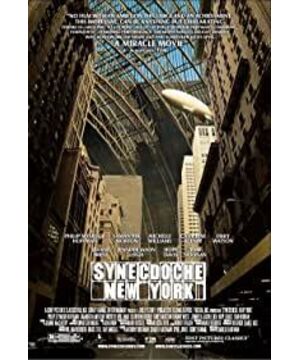This is another "meta movie", the script can be called "meta script"
But it's really hard to understand just watching it once. I remember that the first time I tried watching this film was at home during the winter vacation of freshman year of high school. In the first ten minutes, those images and quick clips such as "green poop", "sink failure", "expired milk", etc., except the sharp-eyed audience can see the time jumping and jumping In addition, I can hardly understand what the film is talking about, and the experience is extremely poor. Coupled with the title of the film, "Symbolism", what is synonymy, the director is too contrived.
But after the opening, after Cotard won the MacArthur Award, the film gradually improved. As Kaufman's directorial debut, he is still obsessed with his old line of work. This is what you find, this film is a screenwriter writing a screenwriter, and the screenwriter in the play wants to sum up his life in one day. (To show off, if we think of time as continuous, this is mathematically feasible, that is, there is a mapping that maps [0,1] to [0,+∞), the mapping here can be seen as The screenwriter, that is, the screenwriter's treatment of reality is also continuous, that is, the screenwriter can make full use of the nature of past events to create the corresponding characters, stories, etc. The world in the play). In the author's humble opinion, the greatness of screenwriting lies in the fact that the influence of irrelevant events 20 years ago on a character can still be manifested 20 years later, thus ensuring a person's continuity in time. The premise is that human memory is also continuous, but this does not seem to be the focus of the discussion in this film.
As a "meta-movie", the difference between this film and "Eight and a Half", "Purple Rose of Cairo", "Suzhou River", etc. is that this film has created a "dramatic sequence", with an infinite number of plays within the play. The loops are so nested that the film needs to find another actor to play him. At the same time, the "representation" of reality in the play will affect the behavior of real characters. This kind of intertextuality between reality and the drama that projects it will also lead to the constant addition of new extras to the world in the play, but the world in the play is an existence in reality, and itself is a kind of reflection on the real world. "Synonym". More and more people entering the drama means more and more people appearing in the drama; the larger the scope of the drama, the greater the scope of non-drama related to cotard, so the gap between entering the drama and appearing in the drama itself It's hard to tell. Life is like a play. The difference between the characters in the play also approaches zero after experiencing infinite "allusions" (a self-to-self projection, plus infinite loop nesting, it is easy to think of the fixed point theorem, plus The continuity assumption of a paragraph and the compression from a lifetime to a day can intuitively help understand the conclusion that everyone is everyone, that is, if I can find me in the play, it is impossible for me to judge whether I am in the play or not. At the same time, it can indeed find me. The fixed point theorem (or compression mapping theorem) says that f(x0)=x0, now I can't find myself, that is, can't find x0, but if we can find f(x0 ), that is, me in the play, which is equivalent to finding myself. There may be some problems with the logic, but it is very interesting)
In the end, what the film did, is what the title says. (Also probably understand what is called synonymy)
The above is pure gibberish, showing off mathematics. But I do feel the help of mathematical language for describing some truths.
View more about Synecdoche, New York reviews











